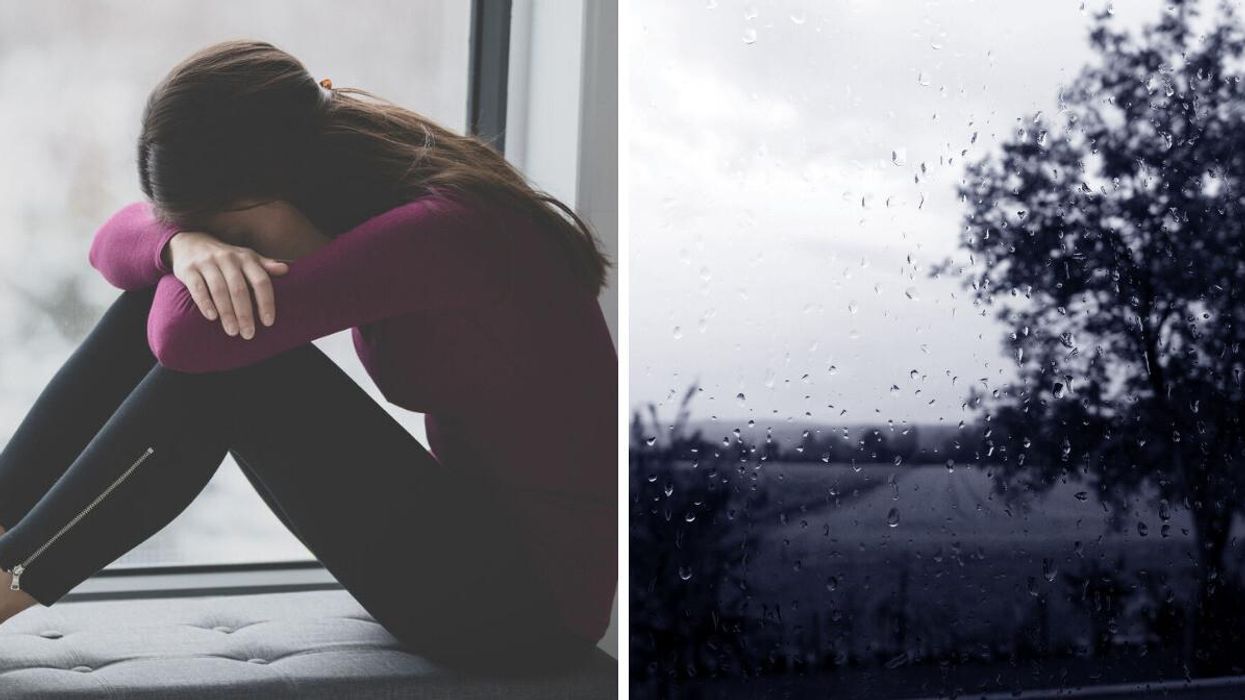Blue Monday Is The Saddest Day In January & Here's How To Beat Those Big Sad Days In 2023
Is Blue Monday even real?

A sad young woman. Right: A gloomy day.
The holidays are over, the weather is crummy and you may not get to see the sun as much as you'd like — a combination like that can leave anyone feeling blue.
That may hold especially true on "Blue Monday" which falls on January 16 this year.
For years Blue Monday has been called the saddest day of the year, but is there any truth behind that?
We wanted to know more so we spoke to an expert about the origins of Blue Monday and how people can cope if they're experiencing the winter blues.
Is Blue Monday real?
Dr. Michael Mak, a psychiatrist and sleep specialist with the Centre for Addiction and Mental Health (CAMH), tells Narcity that although there is no science backing Blue Monday, there is truth to the fact that people are more likely to be depressed this time of year.
That's especially true in North America where nights are long and cold during the winter.
"We know that the lower levels of light exposure that we get in the winter months can cause a person to develop seasonal affective disorder or seasonal depression. That's real," Mak said.
Why is Blue Monday a thing?
It turns out that Blue Monday was created as a PR stunt to sell more vacations at this time of year.
According to CNN, the term was created by psychologist Cliff Arnall in 2005 when a British travel company asked him for a formula for the gloomiest day of the year and when people would be most inclined to book a holiday.
Some experts feel that Blue Monday "is not the right way" to raise awareness about mental health.
“By saying this single day is the most depressing day of the year, without any evidence, we are trivializing how serious depression can be," Antonis Kousoulis, director of the U.K.’s Mental Health Foundation, told CNN.
In their Blue Monday Survival Guide, the CAMH says the calculation was made based on a number of factors including ugly weather, a person's debt they accumulated over the holidays and disappointment over not keeping up with one's new year's resolutions.
"This may seem like fun pseudoscience, but it can have a powerful influence on the psyche," says CAMH psychologist Dr. Donna Ferguson.
What is seasonal depression and winter blues?
According to the U.S. National Institute of Mental Health, millions of people suffer from Seasonal Affective Disorder (SAD) and many may not even know they have the condition.
SAD is a type of depression related to changes in season and begins and ends around the same time every year. It affects about 5% of adults in the U.S. but only about 2-3% in Canada.
Mak explained "[SAD] is when a person will have a loss of enjoyment in their lives: a feeling of depression, impaired sleep, impaired appetite, problems with energy and concentration."
"If you have those types of symptoms, or if you start to lose meaning in your life, you may wish to consult a medical professional."
Unlike SAD, a case of winter blues is not a medical diagnosis and is much more common.
The U.S. National Institutes of Health says winter blues are often linked to something specific, like stress during the holidays or being away from family and friends, it will typically go away on its own.
How to cope with seasonal depression and winter blues
However, there are ways that those affected can cope with seasonal depression. Mak says a large part of that is light exposure.
"Upon awakening I recommend that folks expose themselves to light that they have at home so turning on all the lights in the winter months," he explained.
"For some people they may wish to invest in a seasonal affective disorder bright light therapy device. These are bright lights that have a minimum brightness of 10,000 lux [...] for half an hour daily," Mak added.
"We know that that's as good as taking antidepressant medications if you indeed have seasonal affective disorder."
Other recommended lifestyle changes include exercising for 30 minutes a day, eating a well-balanced diet and getting proper sleep.
When is Blue Monday?
Blue Monday always falls on the third Monday in January. In 2023, it falls on January 16.
If you or someone you know is struggling with depression or mental health concerns, please reach out to a trusted peer, parent or health care professional. You can also send a text message to 741741 24 hours a day or consult these additional resources. If you need immediate assistance, please call 911 or go to your nearest hospital. Support is available.
This article's cover image was used for illustrative purposes only.
- CAMH Says Canadians Under 40 Are Experiencing Anxiety & Depression More Than Anyone Else ›
- All 50 US States Were Ranked From Happiest To Saddest & West Virginia Is Looking Depressed ›
- Here's Why Seasonal Affective Disorder Makes You Sad In Winter & How To Cope ›
- Seasonal Depression In Canada Is No Joke — But Here's How I've Learned To Cope ›
- 7 Things I've Learned In Therapy That Have Actually Changed My Life For The Better - Narcity ›